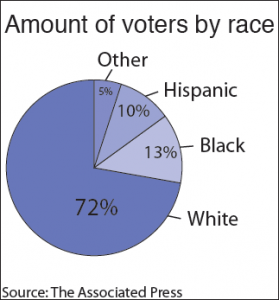Obama helped by record number of minority voters

November 14, 2012
People of all races journeyed to the polls in record-setting numbers Election Day to cast a ballot for the presidential candidate of their choice.
According to election results, non-whites accounted for 28 percent of voters this year. In 2000, minority voters made up 20 percent of the vote. The large turnout helped President Barack Obama’s re-election bid as he claimed 80 percent of non-white voters.
Charles Leonard, a lecturer of political science, said minority votes were important for Obama to win.
Advertisement
“Although most of the president’s votes came from white voters, the very large margins among minority groups and young people pushed him over the top in a close election,” he said.
John Jackson, a visiting professor in the University Honors Program, called the minority voter turnout outstanding.
“Those voters were extremely important,” he said. “They helped President Obama win a fairly decisive victory in the popular vote and a clearly decisive victory in the Electoral College.”
Obama first used his popularity among minority voters to win the 2008 presidency. He also claimed nearly 80 percent of the non-white vote in that election.
This year, Republican candidate Mitt Romney edged Obama among white voters as he claimed 59 percent of the non-Hispanic white vote, according to national election results. However, the number of white male voters to turn out this year was at 34 percent, according to the Associated Press, and it has steadily declined since the 1970s. Altogether, whites made up 72 percent of voters.
Christopher Stout, an assistant political science professor who specializes in minority voting behavior, said Obama would have been defeated in a number of key states, including Ohio, Florida, Nevada and Colorado if he had not garnered the high support levels from Latino voters and the increased turnout among both blacks and Latinos.
“Barack Obama’s platform was one that appealed more to black and Latino voters,” Stout said. “Latinos believed that Obama’s platform would better address the economy, whereas studies showed only 18 percent of Latinos trusted Romney. Latinos were more likely to believe that Obama would be able to pass immigration reform than Mitt Romney. Blacks also believed that Obama’s economic plan would be better for them than Romney’s plan.”
Advertisement*
The record amount of minority voters may be a result of the Hispanic and Asian population growth in the U.S. Since 2000, the two groups have grown by more than 40 percent, according to U.S. Census results.
Hispanics — the largest minority group in the U.S. — make up 17 percent of the nation’s population, compared to 12 percent for blacks and 5 percent for Asians. According to the data, minorities now make up more than 36 percent of the U.S. population.
Leonard said trends show that these numbers will heavily favor the Democratic party, regardless of who the candidate is.
“It’s important to remember that African-American and Hispanic voters tend to vote Democratic by large margins, regardless of the race of the Democratic candidate,” he said. “So I would say they voted for Obama because he is a Democrat, not because he is black.”
Stout said Obama’s race did factor into the election, though. He said studies show that voters are more likely to vote when there is a candidate on the ballot who looks like them.
“Blacks are more likely to vote when there is an African-American on the ballot, and whites are more likely to vote in elections with two white candidates,” he said. “There are a number of explanations for this, including an empowerment effect where voters feel closer and more important in a political system when they are represented by someone who shares their race ethnicity. In this way, Obama’s presence on the ballot may have inspired higher levels of black turnout.”
Jackson said he thinks voting is particularly important for blacks because of the history of discrimination against them.
“Obama clearly favors civil rights and other policies, which most African-Americans also favor,” he said. “He also favors student loan programs, which are crucial to young people. Those programs would not have been supported in a Romney administration.”
Shire Hopkins, a junior from Chicago studying paralegal studies, said she would have voted in the election no matter what.
“I still definitely would have voted,” she said. “People haven’t always had the right to vote, so you should want to take advantage of it right now. I really wanted to take advantage of that opportunity because my great ancestors didn’t have that chance.”
Faith Kennon, a junior from Chicago studying early childhood education, said she was excited to vote because it was her first chance. She said she would have voted regardless of who the candidates were.
“It’s an election, and that’s what you are supposed to do as an American citizen,” she said. “It’s just something you do.”
Kenneth Lucas, a junior from Chicago studying criminal justice, said he looked beyond race when he decided which candidate to vote for. He said he looked at Romney’s and Obama’s stances on key issues before casting his vote.
“You have to go deeper than that,” he said. “You have to look at his policies. I was in favor of him for more than just his race.”
Mohammed Alaswad, a junior from Saudi Arabia studying information systems technology, said he was unable to vote because he is not an American citizen. However, he said he was still interested in the results because they will have an effect on him.
He also said he hoped every American would take advantage of his and her right to vote because his country doesn’t offer the same privileges.
“There is no election there,” he said. “It is really good that people get to choose their leader here. Since there’s more than one option, there’s a much better chance to choose who best fits your needs.”
Advertisement








